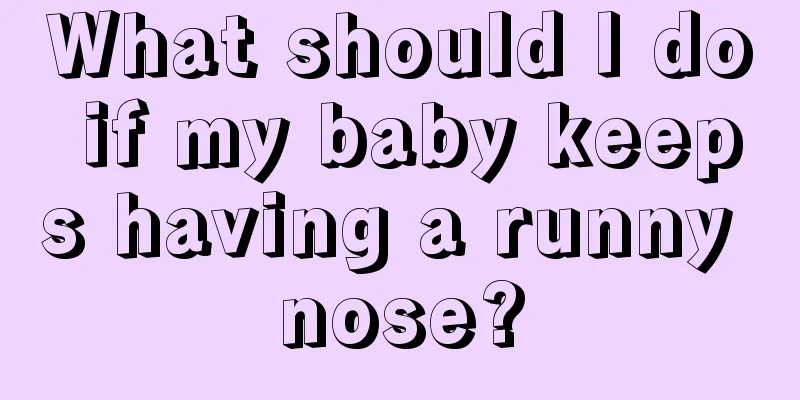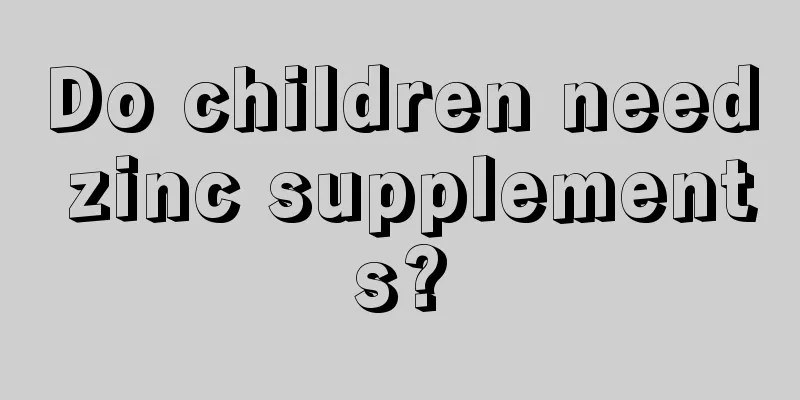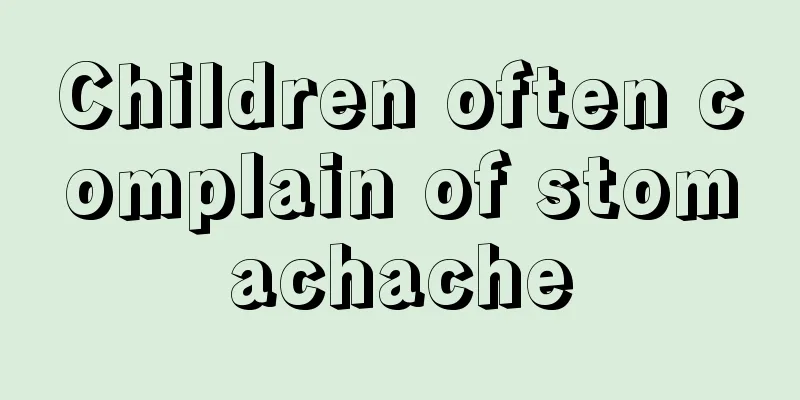What should I do if my baby keeps having a runny nose?

|
Nowadays, most families have only one child. Whenever the child is sick, the parents are more anxious than the child, especially when the baby has a cold and a runny nose. The child's little nose is rubbed red. Every time the child's nose is wiped, the child is always unwilling. And because of this situation, it will also affect the child's diet. So what should I do if the baby has a runny nose? 1. Hot compress: Wet a towel with hot water and apply it to the baby's nose. If the towel is cold, change it to a hot one. Repeat this process several times. As the nasal mucosa shrinks when exposed to heat, the nasal cavity becomes more unobstructed and the sticky mucus becomes easier to hydrate and flow out. Be gentle when applying hot compress. If you find mucus in your baby's nostrils, you can first clean it with a cotton swab dipped in water; you can also slowly massage the baby's nose or both sides of the nose. 2. Soak your baby’s feet and drink more warm water: Soak your baby’s feet in warm water before going to bed. You can also add a few slices of ginger to the water to keep out the cold. But be careful not to overheat the water so as not to scald your baby. When the water gets cold, you can keep changing the water until sweat appears on the child's forehead and let the child drink more warm water. It helps the baby's blood circulation, thins the mucus, makes it easier to clean, and allows the baby to rest early. 3. Steaming and moisturizing the face: If you have a facial steamer at home, turn it on and point it towards the baby's face to let him come into contact with moisture and heat. Steam can moisten your baby's nasal cavity and drain a lot of mucus quickly and naturally. But be careful not to place the facial steamer too close to the baby to avoid hurting his delicate skin; and the usage time at one time should not be too long, about 3 minutes is enough. 4. Increase the indoor temperature or maintain a balance between indoor and outdoor temperatures: If the temperature drops or rises suddenly, the baby will easily have symptoms of runny nose and cold. Since babies are particularly sensitive to external environment and air stimulation, try to keep the indoor and outdoor temperatures balanced so that they will not suddenly feel overwhelmed when going out. If you don't go out, you can keep the indoor temperature at a comfortable level to relieve your baby's symptoms of nasal congestion and runny nose. 5. Cleaning the snot: When the baby has too much nasal secretion and heavy nasal sound, the mother can use a nasal aspirator to help the baby clean the snot. But be careful when using it. When sucking through one nostril, press the other nostril at the same time, and the effect will be better. In addition, the nasal aspirator can absorb a large amount of nasal mucus and secretions at one time. Before use, it is recommended that parents check whether there is any nasal mucus in the baby's nasal cavity. Keep the action gentle to avoid going too deep into the baby's nasal cavity to cause pain or injury. Clean it thoroughly after use. 6. Honey garlic paste: This diet therapy is not suitable for all babies. It is prohibited for babies under 1 year old because babies under 12 months old may be poisoned if they eat honey. But babies over one year old can try it. The method is to take equal amounts of mashed garlic and honey and mix them evenly. Take with boiled water at about 80℃, one tablespoon each time, 4 to 6 times a day. It is very effective for runny nose caused by influenza. 7. Boil water with scallion whites: Boiling water with scallion whites is very effective in relieving babies’ runny noses caused by colds. Cut the scallion whites into finger lengths, then add about 300 ml of water and boil it. If the baby finds it too pungent and doesn’t want to drink it, you can add some rock sugar to make it easier for the baby to accept. If your baby has a runny nose all the time, you should take timely measures to deal with it. Whether it is hot compress, foot soaking or face steaming, you must pay attention to the child's safety. If the child's condition is more serious, it is best to take the child to the hospital for a detailed examination. Sometimes frequent runny noses may indicate rhinitis. Make sure your child drinks more water and rests more. |
<<: What medicine is effective for a 10-year-old child with a fever?
>>: What are the best ways to improve students' memory?
Recommend
What are some recipes for children to grow taller in spring?
Spring is a season of growth, and it is also a se...
Treatment for childhood convulsions
The health of children is the happiest thing for ...
How to treat congenital heart disease in children
Congenital heart disease in children is a type of...
White spots on the child's face
Children are the group of people that families an...
How to get rid of phlegm in newborns
Newborns are prone to various diseases because th...
Can children's ADHD heal itself?
ADHD is a relatively common disease, which poses ...
When does a child's teeth change?
Each of our children will go through a stage of t...
What is the cause of the child's black teeth?
Every parent does not want their child's teet...
What kind of soup is good for children in autumn?
Drinking soup is an indispensable eating habit in...
Why does a baby sneeze and have a runny nose?
The coming of a baby into this world brings us a ...
What causes a child to cough even when he doesn’t have a runny nose?
People often cough. From a physiological point of...
Mydriasis treatment for children is very effective
Children's eye health is very important. If a...
What should I do if my baby has blisters on his palms?
If parents find blisters on their baby’s palms, t...
What harm does fluorescent agent have on babies?
When it comes to fluorescent agents, many people ...
What should I do if my child’s anus hurts?
In life, whether adults or children, the body wil...









